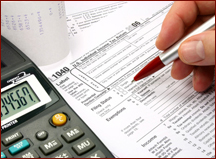|
 Since January 1, 1991, Canada (federal government) has a value-added tax. This taxation system is somehow similar to the situation in more than 50 countries.
Since January 1, 1991, Canada (federal government) has a value-added tax. This taxation system is somehow similar to the situation in more than 50 countries.
At each production stage of a good or service, this tax is collected from the buyer by the seller. The seller needs in most cases to be a GST/QST registrant and is required to and responsible for charging the tax. In the Province of Québec, QRA is managing TPS, QST, HST. Each registrant has to pay the difference between the tax collected and the tax it paid on good purchased.
As mentioned above, the TPS was adopted in Canada on January 1 1991. In Québec, the TVQ (similar to the TPS in many aspects) was adopted on July 1, 1992.
In 1997, the provinces of Nova Scotia, New Brunswick, Newfoundland and Labrador and the Government of Canada merged their respective sales taxes into the harmonized sales tax (HST). In New Brunswick, and Newfoundland and Labrador, the current HST rate is 13%, while in Nova Scotia it was raised from 13% to 15%, effective July 1, 2010. HST is administered by the Canada Revenue Agency, with revenues divided among participating governments according to a formula.
Ontario and British Columbia both harmonized the GST with their provincial sales tax (PST) effective July 1, 2010. However, the British Columbia HST was defeated in an August 2011 mail-in referendum by a 55% majority vote,[4] and was converted to the old GST/PST system effective April 1, 2013.
General information
You have to register for a GST/HST account if both situations apply. You provide taxable supplies in Canada and you are not a small supplier. Taxable supplies are supplies of property and services that are made in the course of a commercial activity and are subject to the GST/HST (including zero-rated supplies). Commercial activity means any business or adventure or concern in the nature of trade carried on by a person, A person is an individual, a partnership, a corporation, the estate of a deceased individual, a trust, or any organization such as a society, a union, a club, an association, or a commission.
You do not have to register for GST in the following situations :
- you are a small supplier (see below);
- your only commercial activity is the selling of an immoveable property without being in business to do so;
- you are not residing in Québec or Canada, and do not have business activities.
Small supplier limits
A small supplier refers to a person whose revenue (along with the revenue of all persons associated with that person) from worldwide taxable supplies was equal to or less than $30,000 ($50,000 for public service bodies) in a calendar quarter and over the last four consecutive calendar quarters.
In case of doubt, please request professional advice before submitting information to tax authorities.
Contact us.
Overview of transactions
Interests and penalties are very costly with regard to GST and QST. Taxpayers under the obligation to collect taxes are doing so on behalf of the Government. The money transits through the taxpayer, but the taxpayer is never the owner of the taxes. Thus, the tax authorities are uncompromising on this matter. The Excise Tax Act and the Québec Sales Tax Act are extremely complex. We can proceed to a preventive overview of tax matters.
Support during an audit
A tax audit by the Québec Revenue Agency (GST & QST) could jeopardize your operations greatly. Most taxpayers are unfamiliar with the audit process, and auditors know what they’re doing. An assessment in taxes matter can have a huge impact on a company’s cashflow knowing that the taxpayer has to pay right away even if an appeal is made. It is of the utmost importance to take the audit seriously and address all problems promptly.
|